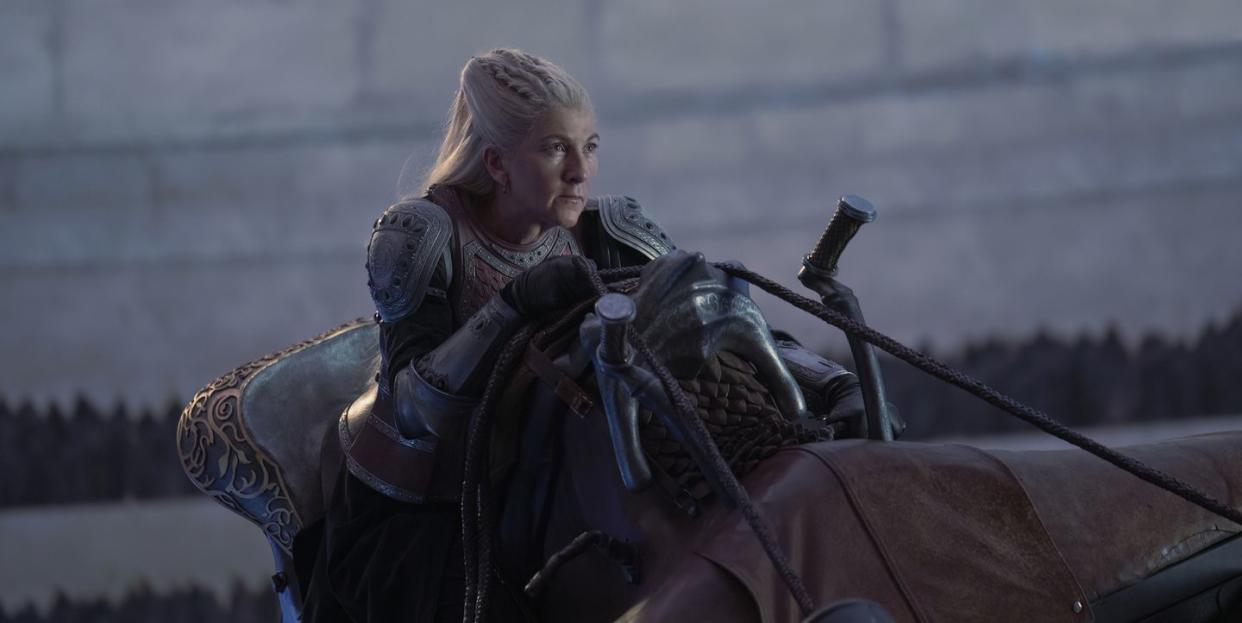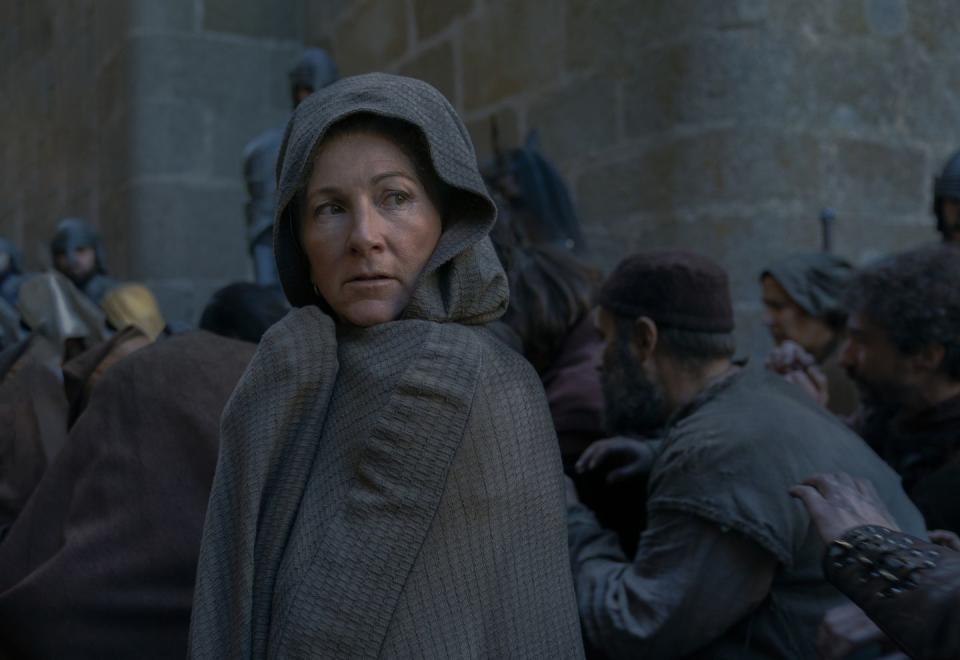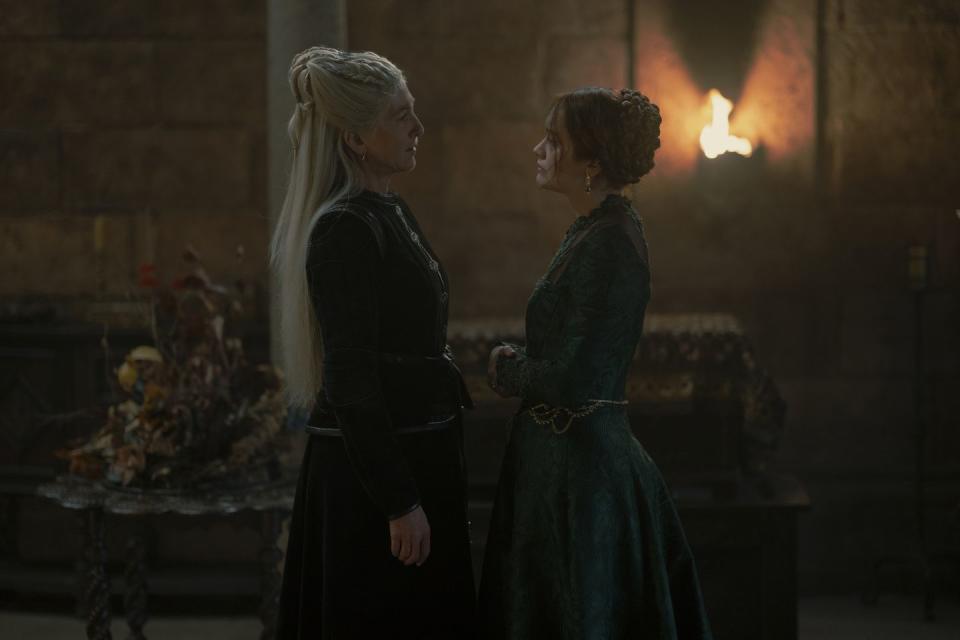The Curious Case of Rhaenys’s Choice In 'House of the Dragon' Episode 9

- Oops!Something went wrong.Please try again later.
"Hearst Magazines and Yahoo may earn commission or revenue on some items through the links below."
Helaena tried to warn us. For multiple episodes of House of the Dragon now, the princess (and suspected dragon dreamer) has blurted out her prophetic warnings about “a beast beneath the boards,” stumping both her exasperated family members and the larger Dragon audience. But someone better start listening to her as the series descends further into chaos. She knew what she was murmuring about: A beast did lurk beneath the boards, and it revealed itself in spectacular (though puzzling) fashion in season 1’s penultimate episode.
In the final moments of “The Green Council,” as the usurper king Aegon II is bestowed the Conqueror’s crown before the common folk of King’s Landing, Princess Rhaenys bursts through the floors of the Dragonpit on dragonback. She wields Meleys’s tail as a ball-and-chain and the beast’s roaring maw as a ready flamethrower, likely killing several hundred (or thousand) people whose names and faces we’ll never know. Only after inciting mass hysteria does she turn to her kin upon the dais, where every member of the Hightower brood (and, by extension, the so-called greens) stands, immobilized. Queen Alicent rushes in front of her newly crowned son, closing her eyes in anticipation of death by roast. Princess Rhaenys grants her a withering stare of disappointment before turning and soaring out the chapel’s open doors.
The moment is the last of the episode’s sequences, meaning it’s the freshest scene on anyone’s minds as the credits roll and social media boils over in a rush to unpack its meaning. But Rhaenys’s choice is interesting not for what it represents to Dragon’s plot—that much is obvious—but for its relative incoherence in the realm of character development. We’ve always known this war was coming. But for Rhaenys to be the one to start it? That’s a bizarre bit of character shuffling.

The case of the Queen Who Never Was was already a curious one. We know from Dragon’s source material, George R. R. Martin’s Fire & Blood, that Rhaenys was “a fearless young beauty,” one who arrived at her wedding to Ser Corlys Velaryon on the back of her dragon, Meleys, once the mount of King Viserys’s own mother, Alyssa. And we know that some within the Red Keep wanted Rhaenys to be named heir from her first breaths; she was, after all, the firstborn child of the Prince of Dragonstone, Aemon Targaryen. As Martin wrote in Fire & Blood, “When Queen Alysanne held [Rhaenys] in her arms for the first time, she was heard to call the little girl ‘our queen to be.’”
We also know that Rhaenys was passed over numerous times, both in the book and in the show. When the Old King Jaeherys named Viserys his heir, Rhaenys became the “Queen Who Never Was,” a slight from which her husband, Corlys, never could seem to recover. We see this resentment fester throughout Dragon as Corlys wrestles to secure House Velaryon’s legacy, even as Rhaenys chides him for his reckless pursuit of the throne.
“The crown was yours until those fools at the Great Council plucked it from your head,” Corlys tells his wife in episode 7, “Driftmark.” “Is it such a terrible thing for your husband to wish to win it back?”
“Tonight of all nights, let us lay aside this falsehood,” Rhaenys replies, her eyes arcing up behind her lids. “It is not justice for your wife that drives you. It is your own ambition.” Later, she adds, “I gave up the idea of wearing a crown a generation ago. It is you, lord husband, who refuses to abandon this pursuit.”
That’s a rare—and important—bit of character insight as we move into episode 9, which features an exchange between Rhaenys and Queen Alicent mere hours before the showdown at the Dragonpit.
When Rhaenys learns that Alicent is usurping the throne in alleged fulfillment of Viserys’s dying wish, she scoffs, even smiles. Alicent attempts to lay down the reasons why Rhaenys ought to rally for the greens regardless: Rhaenyra’s squabble for power has led to both of Rhaenys’s children dead, one of them cuckolded, and her husband wasting away after an endless fight in the Stepstones. “Leaving the Lady of Driftmark to chart her course alone,” Alicent adds, leading Rhaenys to swallow, temporarily humbled. But the real kicker hovers as Alicent steps closer: “You should have been queen.”
Alicent insists upon a course within the current system, of women guiding the men who rule through a steadfast, gentle hand. Rhaenys admits there’s a simplistic wisdom to this negotiation of power between wives and mothers, but when Alicent mentions her duty to “count the cost to her people,” Rhaenys’s expression becomes one of admonishment, even skepticism. “And yet you toil still in service to men,” she replies. “You desire not to be free but to make a window in the wall of your prison.” Then, she leans in close enough to whisper in Alicent’s ear. “Have you never imagined yourself on the Iron Throne?”

It’s tough to parse what we’re meant to make of this conversation. Rhaenys’s dialogue wavers between resolved, defiant, subdued and furious. Did the Queen Who Never Was once thirst for the Iron Throne, then abandon the pursuit when it became fruitless, supposedly “a generation ago”? And if she did quash her own desires, did she then resolve herself eternally to the whims of men? If that’s the case, why would she now criticize Alicent for doing the same?
Perhaps the death of both her children (and the seemingly imminent death of her husband) has changed Rhaenys’s mind about who’s best fit to rule. But if that’s the case, why would she side with Rhaenyra and Daemon, whom she still believes might be partly, if not wholly, responsible for Laena and Laenor’s deaths? Is it simply because her grandchildren, Rhaena and Baela, are pledged to wed Rhaenyra’s children, and inherit Driftmark in the process? But that doesn’t track either; Alicent promises Rhaenys Driftmark in exchange for her loyalty.
Maybe now Rhaenys sees a path for her own ascension to the Throne. (Although that seems a stretch.) Does she still yearn for that seat of power, as she seems to allude to Alicent? Or is her siding with Rhaenyra just a sign of female solidarity, of girl power gone wild?
Ultimately, Rhaenys chooses to flee King’s Landing and warn Rhaenyra of the greens usurping the throne. By this point, word has not yet reached Dragonstone—where Rhaenyra and her family live—that her father is dead, let alone that Alicent has plotted to install her son upon the throne instead of Viserys’s named heir. Rhaenys choosing to fly to Dragonstone, especially after having been locked into her chambers courtesy of Alicent, is an act of rebellion.
But it’s a messy one. There’s little traceable character explanation for Rhaenys’s actions beyond a need to march the plot forward. That’s a shame, given how rich Rhaenys is as a character, particularly a female one. Rhaenyra and Alicent, for all their enlightening dynamics, fall somewhat easily into archetypes: the Rebel and the Conformer. Rhaenys toes the line between the two, which makes her all the more compelling. But it also means we needed a stronger grasp of her motivations in order for her choice at the end of episode 9—to fly from King’s Landing rather than fry the usurpers—wholly justifiable.
The behind-the-scenes featurette at the end of “The Green Council” doesn’t make a much stronger case for the legitimacy of the beast beneath the boards. “We needed a penultimate scene, so we tried to come up with, ‘What’s the worst thing that could happen at the coronation?’” says co-showrunner Miguel Sapochnik. “And realized it was a dragon to be let loose.”
He later added the following:
“Rhaenys was not passive, and it felt this was an incredibly valuable moment to, rather than just have her bear witness to something, be able to take part in it, but her moral standpoint become the reason for inaction rather than action.
“She knows that if she sets fire to that dais, she ends any possibility of war, and probably sets peace throughout the realm, but I think probably doesn’t want to be responsible for doing that to another mother. It’s a complex choice, and one that people might dispute or have a problem with, but that’s the choice Rhaenys makes in that moment.”
In an interview with Vulture, actress Eve Best (who plays Rhaenys) tried to make a similar case for the queen’s temperamental objection to kinslaying:
“The temptation is there, right? In the end, she makes a bigger choice. We see that at the moment with what’s going on in Ukraine; to choose not to destroy is the better choice. That’s an important thing for us all to remember right now.
It’s why she would have made such a great leader. She had, in that moment, all the power. Yet she has respect for Alicent as a woman and a mother. They understand being in the grip of other people who might torch them. They know the only right choice is not to go there. Furthermore, it’s the intelligent choice, on her part, not to torch a whole bunch of innocent people in the room. What’s to be gained? In the end, it’s not her battle.”
There are a lot of strong threads to this argument. I agree that Rhaenys would have made a great leader, in part due to her resolve and her restraint. (Although, to be fair, Viserys showed a great deal of restraint, and look where that got us.) I also understand her empathetic connection with Alicent, a mother and ruler whom Rhaenys interprets as misguided, though not of her own accord. They share a bond within the world of men. I can accept that.
What I can’t wrap my mind around is the positioning of Rhaenys as a peace-keeper, saving “a whole bunch of innocent people in the room.” By forcing Meleys to erupt through the floor of the Dragonpit, she immediately kills hundreds, if not thousands, then bats them around with the dragon’s tail for good measure! The Targaryens have seldom had much regard for the common folk. “The realm” has always maintained a gloss of abstraction, rarely made manifest in the needs and wants of real people. (Thus why Mysaria’s conversation with Otto, also in episode 9, about how “there is no power but what the people allow you to take” is fascinating.)
Targaryen supremacy was and is the guiding principle of the ruling house, even for Viserys the Peaceful, who insisted the Song of Ice and Fire end with a Targaryen on the throne. That philosophy is one also maintained by the Queen Who Never Was. So I have a hard time believing that Rhaenys chooses to ignite a civil war in order to...save the people? It’s easier to swallow that Rhaenys didn’t have the heart to kill her kin, but even that logic only extends so far. She’s roundly known as a ferocious force, a triumphant dragonrider. After so much loss, what could sour her stomach now?
Perhaps Rhaenys knows that war will strike the Seven Kingdoms regardless. If she annihilates the greens, perhaps the people will rise up in rebellion. (But again, how often have the Targaryens really considered the power of the people? Against dragons?) Perhaps she merely wishes to escape it all, to run away from the endless fight for a seat made of swords. Perhaps she sees too much of herself in Rhaenyra to leave the true heir alone in her claim to the throne. Perhaps Rhaenys wants the Hightowers to reckon with the horror their scheming—and, let’s be real, their sexism—has wrought.
All of these are possibilities. Some even bear significant weight. Still, it pains me that the case of the Queen Who Never Was remains one of “if”s, “maybe”s, and “perhaps.” The beast beneath the boards was an important enough moment to warrant prophecy. It’s indicative of the show’s shortcomings that the motivations of the beast’s rider earned so little explanation.
You Might Also Like

